- Expert advice/
- Fashion & beauty/
- Wedding dresses/
- 12 Useful Ideas & Tips To Bustle Your Wedding Dress
- Wedding dresses
12 Useful Ideas & Tips To Bustle Your Wedding Dress
Bustling your wedding dress is one way to make sure you can move and groove in your wedding dress during your wedding reception. Read on to learn how it's done.
Last updated February 5, 2024
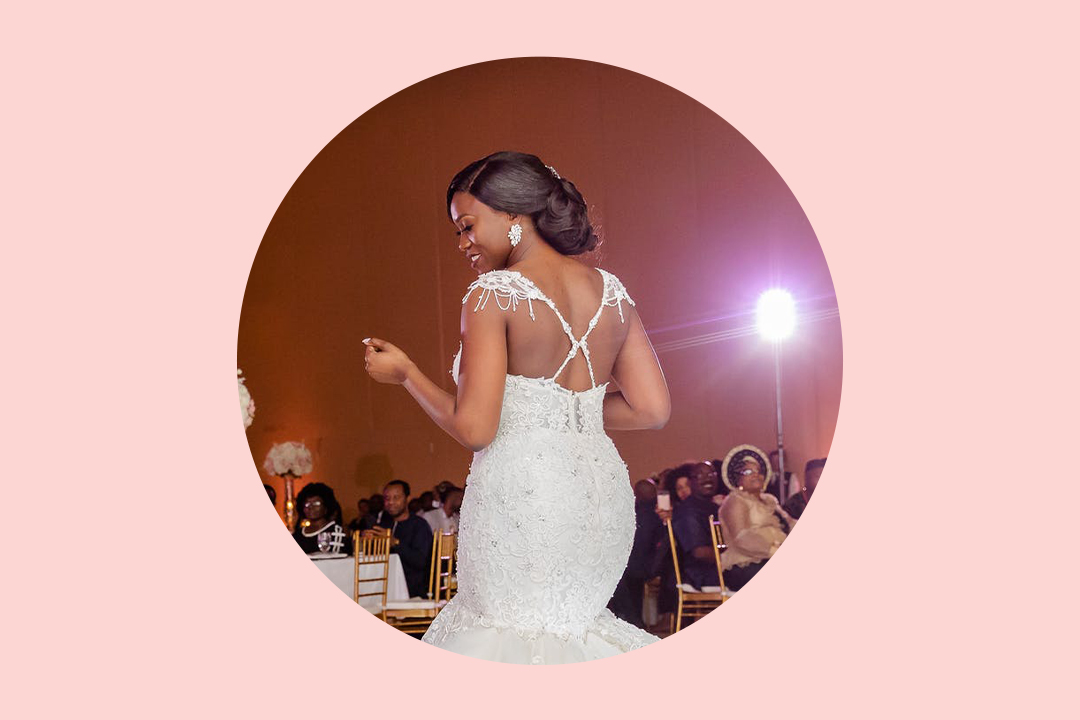
The First Look ✨
- Your bustle lifts and secures your dress train using buttons, hooks, or ribbons. Your seamstress may install a one-point or multiple pickup points, depending on what type of dress you have.
- With an American bustle, you’ll lift the train and hook it over the back of the dress. With a French bustle, the train tucks underneath the dress.
- Always have your MOH or a trusted bridesmaid attend your final fitting, and practice your bustle before your wedding day.
Bustling a wedding dress can be a bit tricky to master. You’ll want to designate someone you trust, such as your maid of honor or another responsible bridesmaid, to be in charge of the bustle. She can attend your final dress fitting to learn how to bustle and practice (and even take notes, if needed).
Properly bustling a wedding dress depends on the type of bustle and the type of dress that you have, so make sure that you check with your seamstress for guidance on your dream dress before your wedding day.
Here’s an overview of how to bustle a wedding dress, so that you’ll be well prepared on your big day.
What Is a Bustle?
Bustles are sewn into the wedding dress to pull the train off the ground, usually with buttons, loops, and/or ties. This allows you to dance and mingle post-ceremony to your heart’s content, without worrying about tripping over your dress.
There are different types of bustles that a seamstress can add to a dress, including an over bustle or under bustle, depending on how the train folds into the dress. Your seamstress may use multiple bustle points to add a more dramatic look to the back of your dress (as seen with a royal bustle). Or, they may use a simple one-point system where the train is secured by one-point on the back of the bodice.
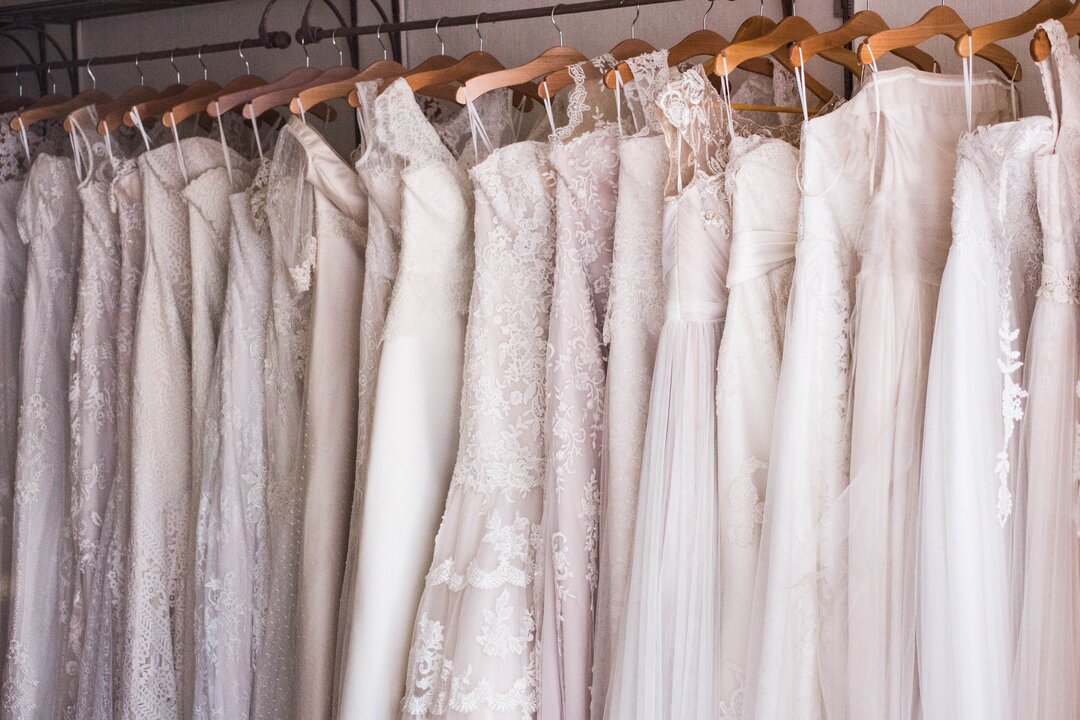
The Different Types of Bustles
Bustle styles vary depending on 1) the type of bridal gown you have (long trains vs. shorter, fuller vs. sleeker), and 2) the way in which you'd like your bustle to look. For the basics on each notable style, read your bustle options below.
1. American (Over) Bustle
With the American over, or traditional, bustle, the train is simply lifted and hooked over the back of the dress along the zipper or waistline. This type of bustle adds a bit of lift or a cascade effect in the back of your dress that looks really fun in photos. It’s also usually a one to three-point bustle, so very easy to do.
- Look for a hook along the train and an eyelet (where you’ll hook the train.) The eyelet is usually located half way down the zipper or along the waistline of the dress. (Alternately, your seamstress may use loops and buttons instead of hooks, depending on what type of dress you have.)
- Lift the train and hook it into the eyelet.
- Straighten out the bustle and you’re done.
Video: https://www.youtube.com/watch?v=RKCeUal8DKc
2. The French (Under) Bustle
The French bustle is sometimes called the under bustle, because—as the name implies—the train folds underneath the silhouette of the dress. With this style, there may be multiple points where they attach to for a dramatic effect, making this type of bustle a bit tougher to get the hang of. But, if your seamstress attaches ribbons to the dress for your bridesmaid, it can be fairly simple to bustle.
For a single-point French bustle:
- Locate the ribbons attached to the dress—one will be underneath the train and the other sewn into the underside of the gown.
- Bring the two ribbons together and tie them into a bow.
- Straighten out the bustle and you’re reception ready.
Video: https://www.youtube.com/watch?v=jAG31x5FHw8
For a multiple-point French bustle:
- Look for the multiple ribbons and loops located along the edges of the train and underneath the gown. These may be numbered or color-coded.
- Match up each ribbon to its loop and tie it into a secure bow.
- When all the ribbons are tied, flip the bustle back over and you are ready to go.
Video: https://www.youtube.com/watch?v=jAG31x5FHw8
3. The Hem, Ballroom, or Flip Under Bustle
The most seamless bustle is the hem, or sometimes called the ballroom or flip under bustle. With a hem bustle, the train is flipped over and secured along the hem of the dress. The dress will remain floor-length, too. With this type of bustle, there are multiple attachments sewn around the hem that the train will tie onto (or hook or button, depending on your dress.)
- Lift up the train and locate the button loops or ribbons along the inside of the dress.
- Tie the first ribbon together, or put the first button through the first loop, and work from left to right.
- Work your way around until all ribbons or buttons are secure.
- Release the dress and smooth out before sending the bride on her way.
Video: https://www.youtube.com/watch?v=ncfKuz5JuQU
4. The Austrian Bustle
An Austrian bustle uses the excess fabric from the train to create a ruched look. This is usually really simple for bridesmaids to bustle, when it’s time.
- Look for the ribbon or cord running down the middle of the train and pull on it, similar to pulling a drawstring.
- This is then tied up at the designated point, usually along the center back seam of the dress.
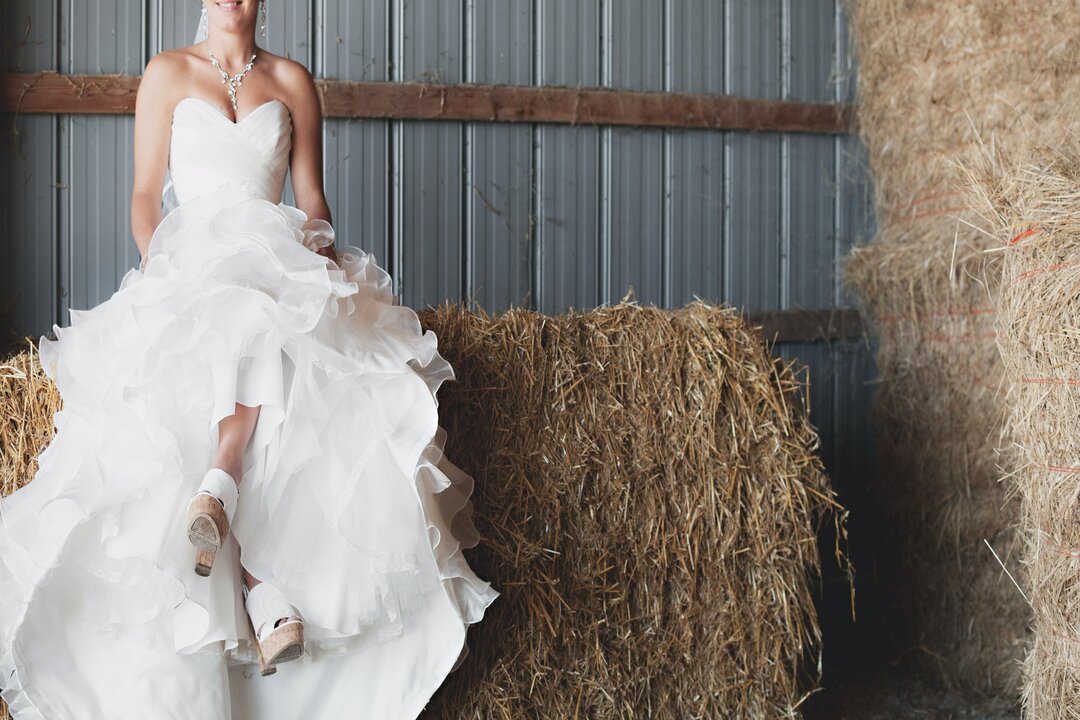
8 Tips for Bustling a Wedding Dress
-
Every dress has a type of bustle that will work best. If you aren’t sure, work with a seamstress who is familiar with wedding dresses and can sew in the appropriate bustle for your dress. You'll want to work with your seamstress on this, as they'll be creating the bustle to match your height during dress alterations.
-
If the idea of tucking your train away seems disheartening—or, perhaps you're going for a more regal look—consider asking your seamstress if a wrist bustle is possible. This is when a loop is added to the underside of your train, so that you can pick up and carry it, from your wrist, at your side. This won't be convenient or doable for all dresses, but can be worth the ask.
-
Speaking of tailoring, remember to include your bustle in your overall dress budget. Typically, this will cost between $75-$250, depending on your gown (e.g. ball gown bustles and those with long trains may be more expensive than dresses with lighter, shorter trains). However, bustles than go for $400+ aren't unheard of.
-
Designate your MOH, a bridesmaid, or another trusted bridal party member as your bustle expert. On the big day, they will be in charge of executing, so make sure that they can attend at least one fitting with you to practice in person (and take notes or a video, if needed.)
-
Take most of your family and newlywed photos before your dress is bustled, so that you can show off your train in all of its glory. We recommend taking photos before or immediately after your ceremony.
-
While it may seem like common sense, you may be so swept up in your wedding day that you forget to bustle your wedding gown. Decide on when you'd like to do so (most brides opt for between their ceremony and reception, or after their first dance) and let your designated bustler know so they can pull you aside at the right moment.
-
If you plan on dancing the night away, you may want to ask your seamstress to install extra loops or buttons to ensure that the bustle stays secure throughout the entire event.
-
That being said, wedding dresses can be pretty heavy. Meaning, bustles can break. Prepare for this rare, but possible event by having a sewing needle, clear fishing line, and large safety pins ready in an emergency bag or up in your bridal suite.
Up next for you
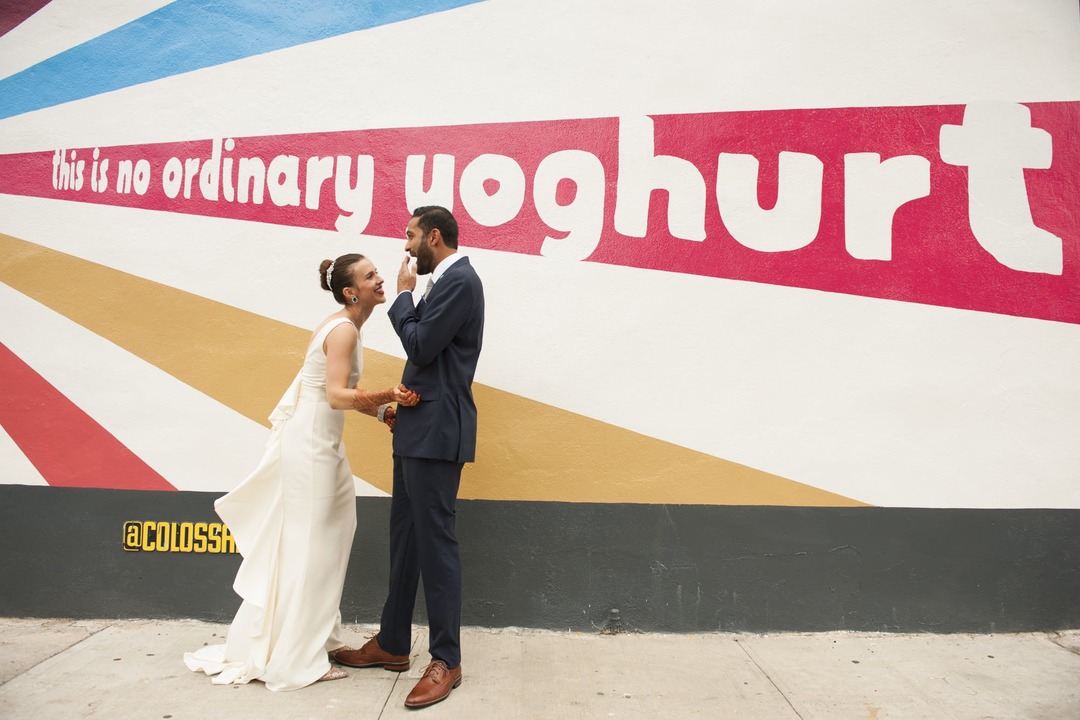
How to Make a Bustle on a Wedding Dress
How-To
A Bustle is an important part of any gown with any length train. Learning how to make a bustle on a wedding dress is simple with these tips.
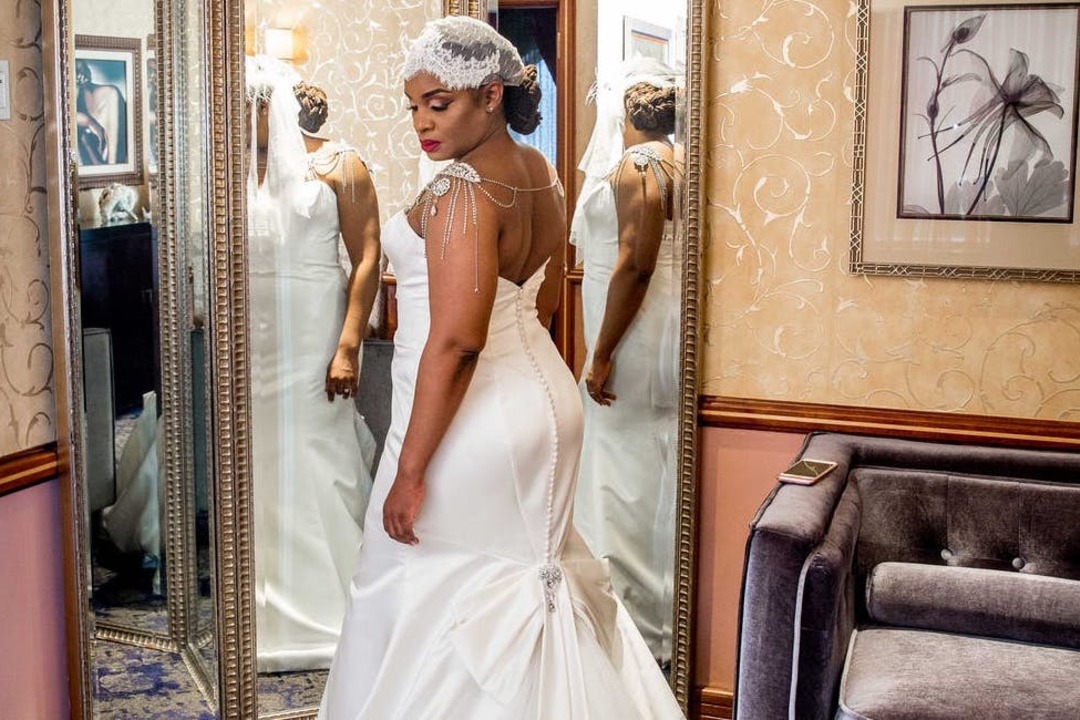
When Should I Bustle My Dress?
Advice
The what, when, and how of a bustle can be complicated. After reading this, you’ll know how to bustle a wedding dress beautifully.
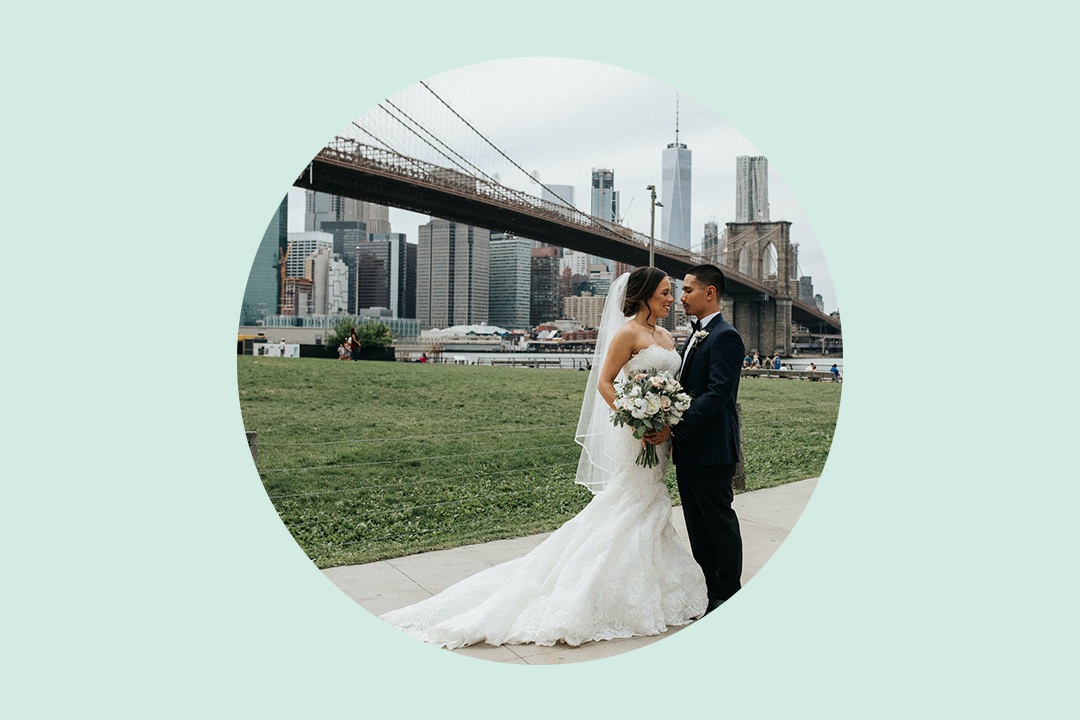
Train or No Train? The Pros and Cons of Wedding Dress Trains
Advice
To have or not to have a wedding dress train? That is the question we will help you answer today.
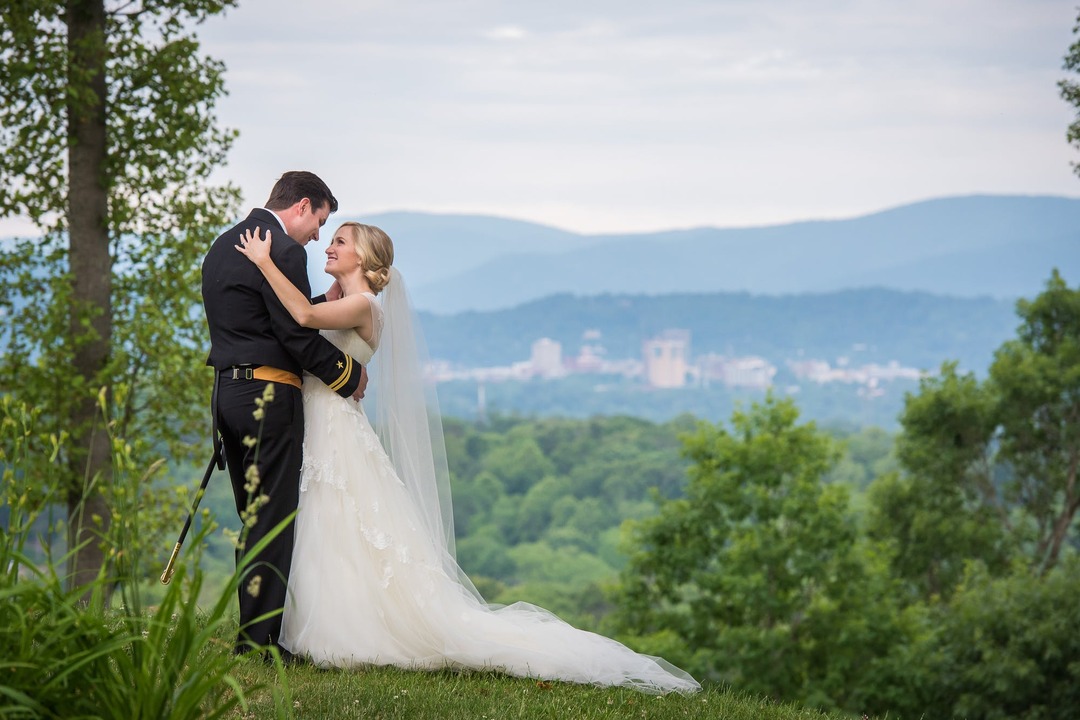
How Do You Attach a Train to a Wedding Dress?
How-To
If you’re looking to add that “je ne sais quoi” to your dress, a detachable wedding train may be right for you.
- Expert advice/
- Fashion & beauty/
- Wedding dresses/
- 12 Useful Ideas & Tips To Bustle Your Wedding Dress
Find even more wedding ideas, inspo, tips, and tricks
We’ve got wedding planning advice on everything from save the dates to wedding cakes.
